Hello, Linkarati readers! I’m back again for another Page One Power recap — this time, for MozCon 2018!
This was the Page One Power team’s third MozCon, and my first trade show. I was excited to attend this awesome event, and very appreciative for the opportunity! Cory Collins and I hit the show as a team, and I appreciated having a MozCon veteran along to help show me the ropes.
A quick aside — I’ve worked for Page One Power for just over a year, and have always been impressed with how the company recognizes and invests in its employees. We’ve discussed our philosophy on how we hire and foster a healthy and productive workplace culture, but few companies I’ve worked for execute on these philosophies in a way that returns so much internal growth and progress as Page One Power.
Leadership has long recognized that our business genuinely flourishes when we invest in the people who work here, and I’ve been so excited to come back to work and start putting the learnings from the show into action!
On to the show!
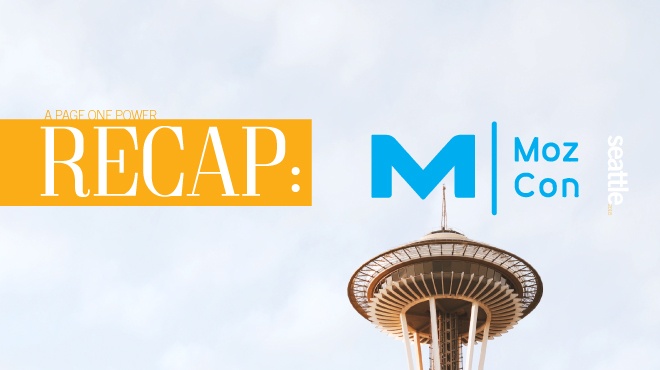
MozCon is an industry darling when it comes to SEO conferences, noted for its thought-leading speakers and forward-thinking lens. This year’s conference took place July 9th - 11th, and each day featured 8 to 10 speakers.
The speakers covered a range of topics, including:
- Technical SEO
- Local SEO
- Voice search
- Mobile-first
- Content marketing
- Consumer research
- Client relations
(Something that impressed me: 16 out of the 27 speakers were women!)
You can explore this year’s official MozCon schedule for summaries of all of the talks, and you can download any of the slide decks for the presentations you’re interested in by clicking the link in the upper-right of each speaker’s slot.
Rich Tatum (@RichTatum) was also awesome enough to share some really stellar, extremely thorough notes from the year’s presentations. I absolutely recommend checking them out, alongside the available slide decks, if you’re curious about any of the speaker’s presentations.
While there were many presentations I enjoyed, I’ve decided to recap some of my favorites, starting in chronological order:
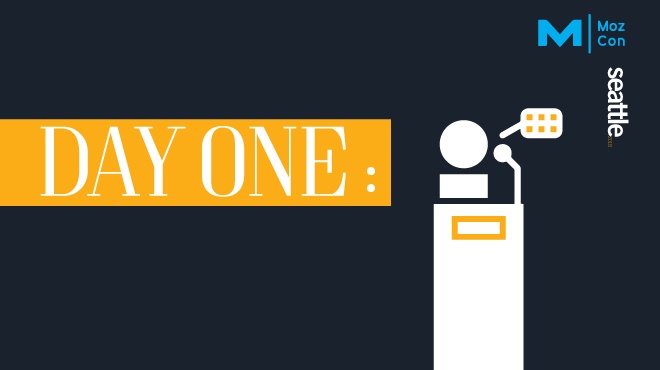
Day 1
Jono Alderson: The Democratization of SEO
Jono Alderson from Yoast opened the show on Day 1 with a discussion about the maturity of the SEO industry, and where we’re headed next.
He began by discussing the current state of technical SEO and the role it plays within most businesses and organizations, highlighting some of the challenges we face with integrating SEO in other marketing disciplines.
He then explained some of the changes coming to the industry, including an update to WordPress called Gutenberg, a new editing environment which is the first step towards making WordPress a full site customizer. As Andrew Dennis mentioned in his quick look at Google’s Webspam Report 2017, Google has been working with popular CMS providers to combat spam and improve quality, and it seems that this is part of that move.
All of this exposition lead us to the main purpose of his talk, which was to encourage SEOs to take a more holistic mindset toward SEO work, addressing root causes of common SEO issues instead of treating their symptoms. He critiqued the “campaign model” that many SEOs use to structure their work for clients, and argued for longer-term solutions.
He also encouraged SEOs to invest in open-source, and to take the lead when it comes to being involved in changes, like Gutenberg, that impact the future of search. He argued that a less competitive, and more collaborative state of the industry would push us all forward and help us really achieve true optimization.
Jono also shared that he had a great time networking backstage after his talk and making new friends. Overall, it was a great start to the first day!
Found this dapper little chap backstage at #MozCon. pic.twitter.com/nHqq2jpJBf
— Jono Alderson (@jonoalderson) July 9, 2018
Taylor Coil: Why “Blog" is a Misnomer for Our 2018 Content Strategy
My next highlight for day 1 is Taylor Coil’s presentation on content strategy — certainly a topic that was relevant to my role here at Page One Power! Taylor is the Marketing Director at Tortuga, a travel gear retailer.
Riding the #MozCon high. Speaking here yesterday was a massive, massive honor. I'm so proud of the work the @TortugaBackpack team has done and am chuffed I got to share it with the marketing world. pic.twitter.com/shgHekKOqX
— Taylor Coil (@taylorcoil) July 10, 2018
Taylor explained the value of customer-centric marketing when it comes to content, and compared differing strategies to highlight how understanding intent can better guide content creation that drives results.
She framed this by presenting a problem: that generally, customers don’t have any loyalty to a brand’s blog or content and are truly most concerned with problem solving. She discussed the ways that relying on a traditional “blog” to house branded content can limit success, explaining how thinking of your brand’s content as libraries of resources can help you create content that serves the intent of your audience.
She also referenced Janessa Lantz’s barbell model for content strategy, which emphasizes content quality over quantity — a common theme across most of the content marketing-focused presentations. Taylor then closed by discussing results, and showed examples of how she employs these strategies in her content marketing work for Tortuga.
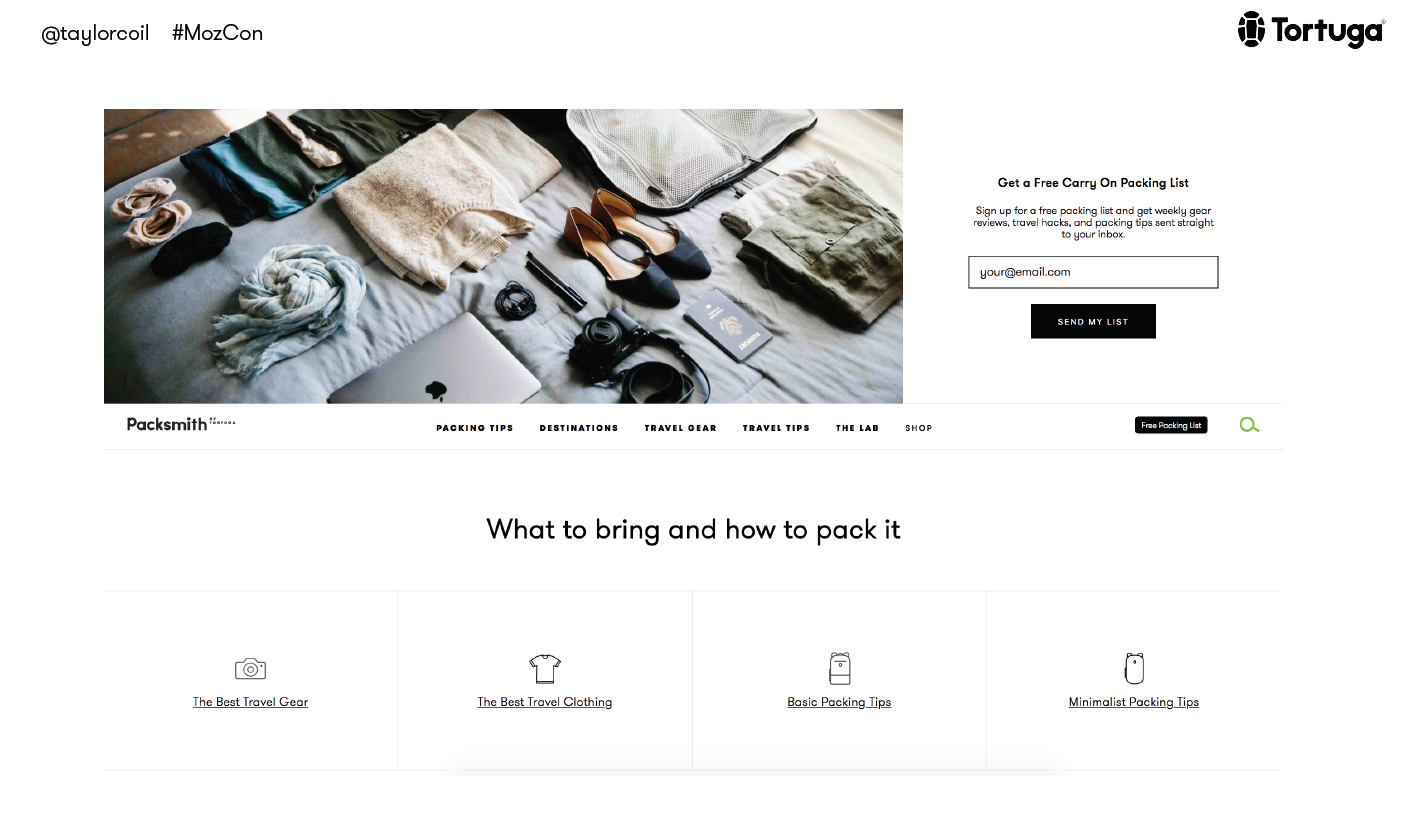
Source: Taylor Coil, MozCon 2018
Stephanie Briggs: Search-Driven Content Strategy
Stephanie Briggs is part of the two-person team behind Briggsby, a digital marketing consulting firm based out of Portland. Stephanie’s presentation was the highlight of Day 1, in my opinion!
Her discussion about using a data-driven approach to inform content strategy was absolutely packed with actionable insights. She gave us a good look at some of the techniques she’s using to improve the competitive research and analyses she performs for her clients — take a look here for a great example:
This is the motion chart from slide 9 of my #MozCon deck. It's @semrush data in @tableau, put into gif form by exporting images of each "page" and assembling in Photoshop. You could also screencast a video. (Also s/o to @justinrbriggs who made 3 diff versions of this.) pic.twitter.com/j2Ugew3qwR
— Stephanie Briggs (@stephbeadell) July 10, 2018
Like Taylor, Stephanie also explained the value of intent when it comes to content strategy, but took it a step further by sharing some of her discoveries about content formatting and how it can influence rankings. She emphasized that, increasingly, content cannot rely on “quality” alone to rank, but must also address intent, and Google now uses format to interpret whether a piece of content suits a searcher’s intent. For example, for certain search queries:
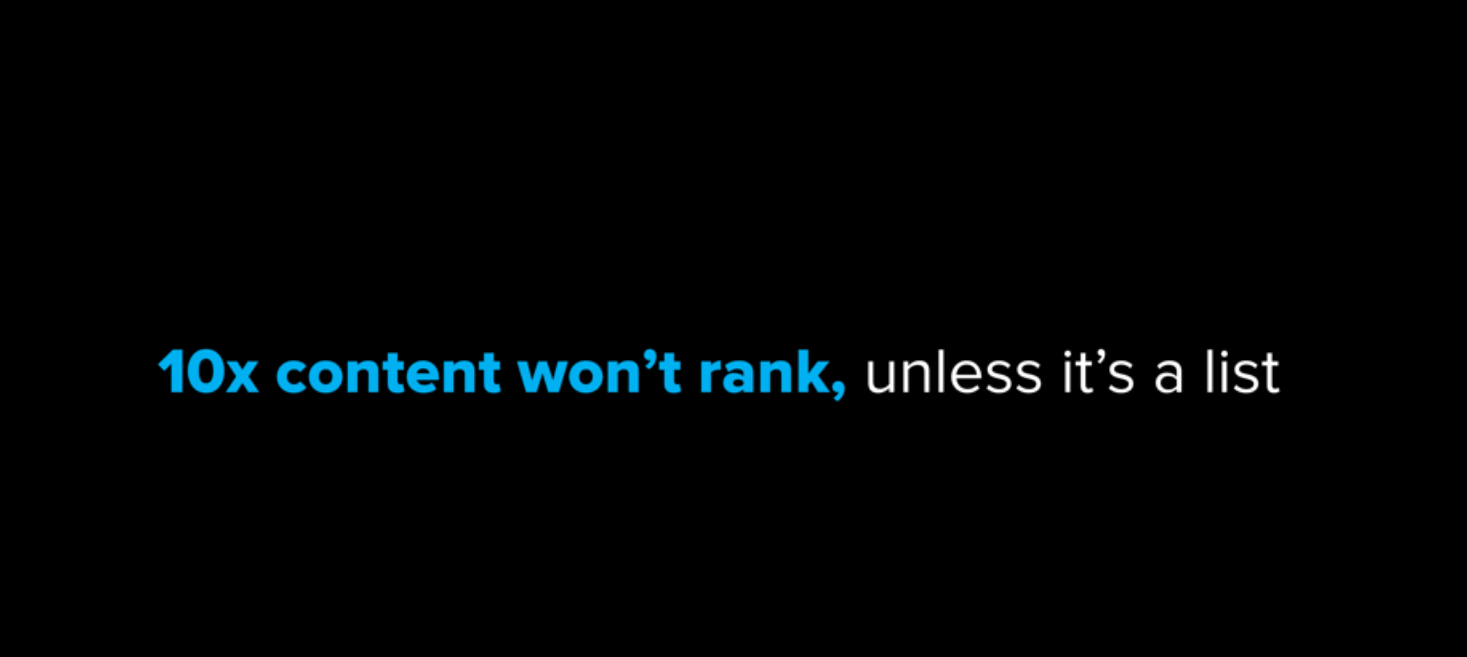
Source: Stephanie Briggs, MozCon 2018
She shared tips and templates for creating content that addresses specific types of queries, according to how Google interprets and indexes content based on searcher intent.
She also highlighted ways to find opportunities to optimize for intent:
- Identify where you’ve lost rankings since 2015-2016
- Identify SERPs where you content is missing the featured snippet
- Question why lower-quality sites are outranking your own, keeping in mind that Google prefers intent over authority, but that it’s best to have both.
If you work in a content marketing role, I highly recommend checking out her slides here! I promise that after reviewing them, you will want to reassess the format and quality of your own content and ask yourself new questions about whether it’s truly optimized.
After the first day’s presentations, Cory and I searched for a good spot to grab dinner (and discovered that even on Mondays, Seattle’s downtown dining scene is busy — a change of pace for us Boiseans!). We then headed off to the night’s networking event, a party at Block 41, which happened to feature one of the Page One Power team’s favorite pastimes — cornhole!
Kudos to @moz for the new format for Monday night. The party at Block 41 was 10x better than the bar crawls of yesteryear. Nice edit to the #MozCon format.
— Yosef Silver (@ysilver) July 10, 2018
After a great night, we headed off to the next day of presentations.
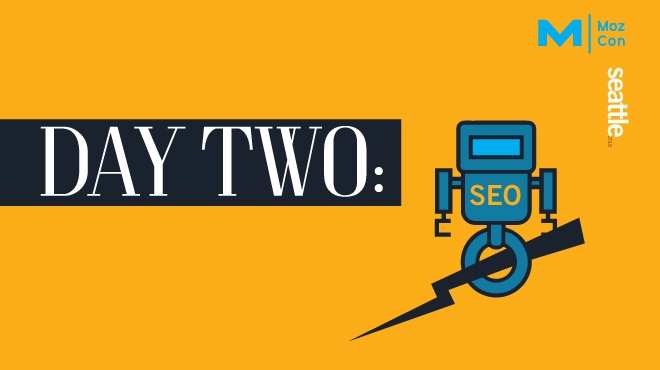
Day 2
Alexis Sanders: The SEO Cyborg
Alexis is an SEO Account Manager at the performance marketing agency Merkle. She began by addressing the challenge of integrating both creative and technical SEO initiatives on an individual level, and described the concept of a team capable of doing both, which she describes as the “SEO cyborg.”
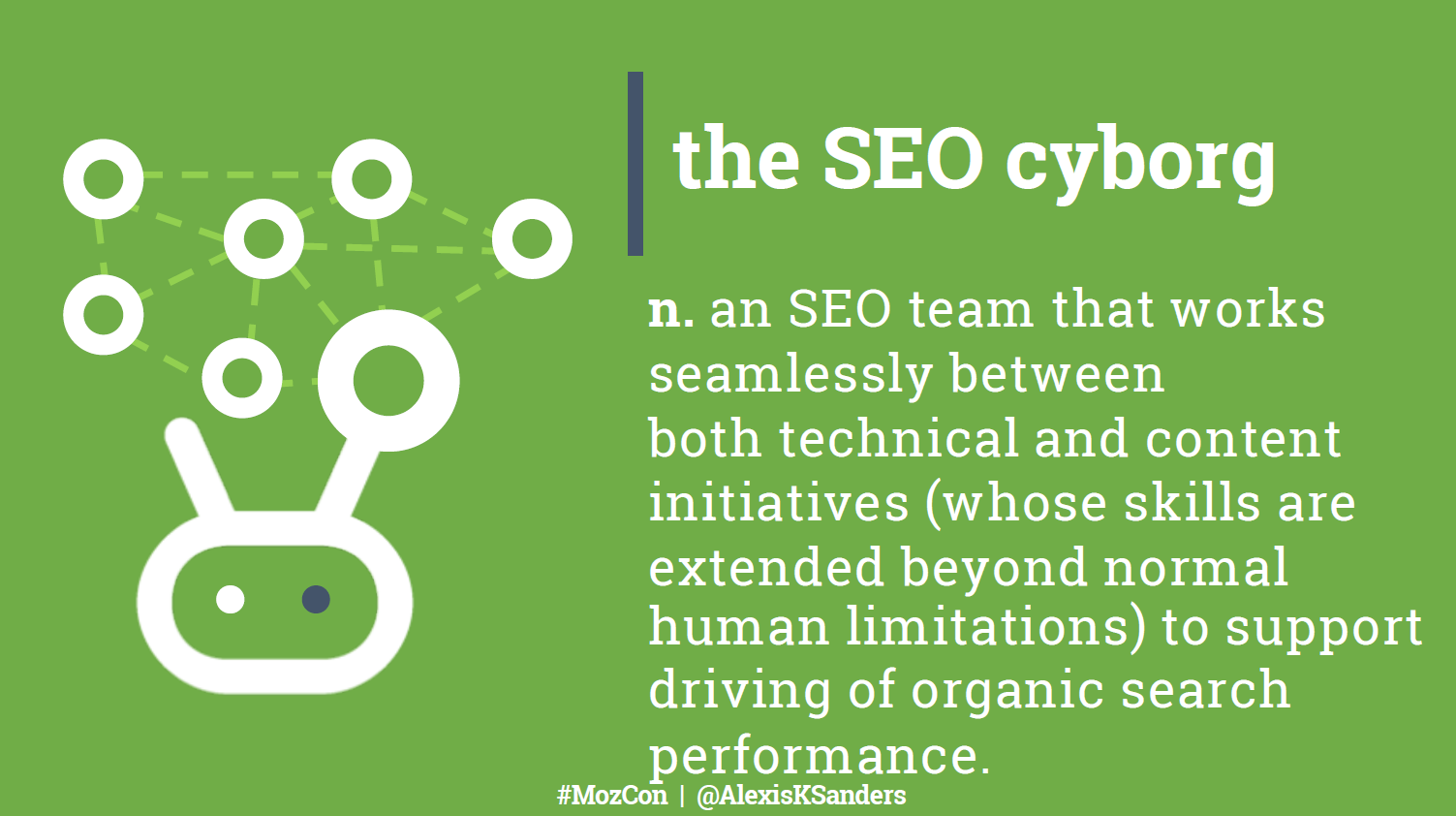
Source: Alexis Sanders, MozCon 2018
This theme, that the scope of the role of the traditional SEO has extended beyond “normal human limitations,” was a common one throughout this year’s conference, and several presenters explored why this is the case, and what we can do about it, in their presentations.
Alexis also discussed how a more nuanced understanding of information retrieval can lead to better integration of technical and content-focused SEO. She explained some biases, or trends, in the way that information is indexed by Google:
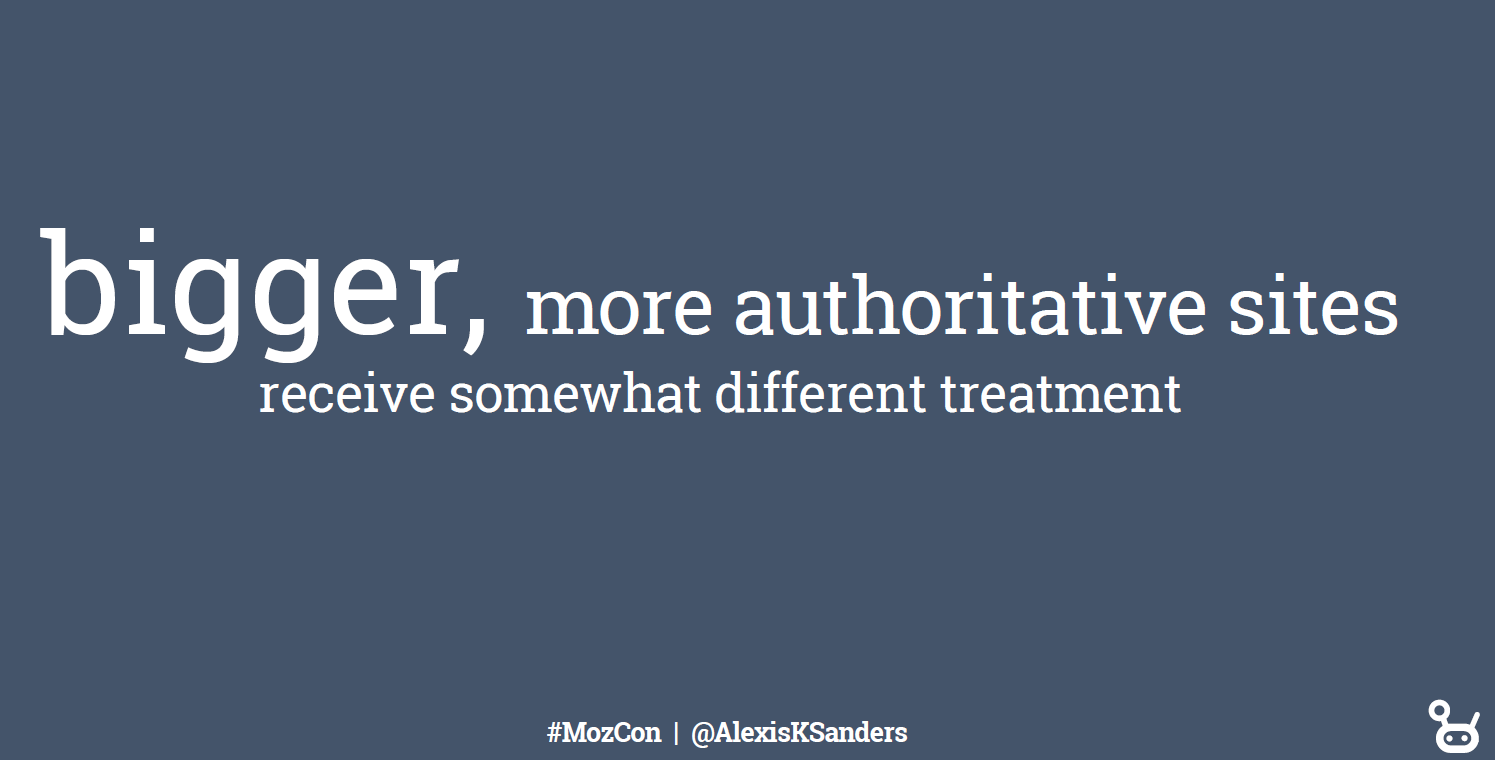
Source: Alexis Sanders, MozCon 2018
And explained the importance of technical SEO in a website’s success, sharing tips on important technical SEO elements and organizing the information architecture of a website. Alexis also emphasized how consumer insights should influence technical SEO considerations. If you’ve got some questions about technical optimization of your site and how they could be impacting performance, I recommend checking out her slides.
Alexis’s dual-sided approach, which addressed both technical and human elements of optimization, provided a balanced perspective on how to optimize for search.
Alexis has also gathered many of her own helpful tweets about MozCon, and ones from others that she enjoyed, in this post over on Medium — take a look for some great tweet-sized summaries of the talks!
Justine Jordan: Email Unto Others: The Golden Rules for Human-Centric Email Marketing
Justine is the VP of Marketing at Litmus, and email marketing software company. While Justine’s talk wasn’t SEO-focused, it was still a great one.
As someone who sends lots of marketing emails, I felt that while this actionable talk touched on simpler concepts than information retrieval models, semantic salience, and advanced data interpretation, it still provided plenty of takeaways that I could bring home and easily implement in my daily work. Particularly when your role within an organization is focused on implementation, like myself, it’s sometimes easy to forget that simple changes to our thinking and processes can have a huge impact!
Justine talked about how to strike the right balance between what humans want and what marketers hope to achieve through emails. She explained some of the problems contributing to the issues we face in effectively marketing through email, and highlighted 6 different trends in email marketing that address those issues.
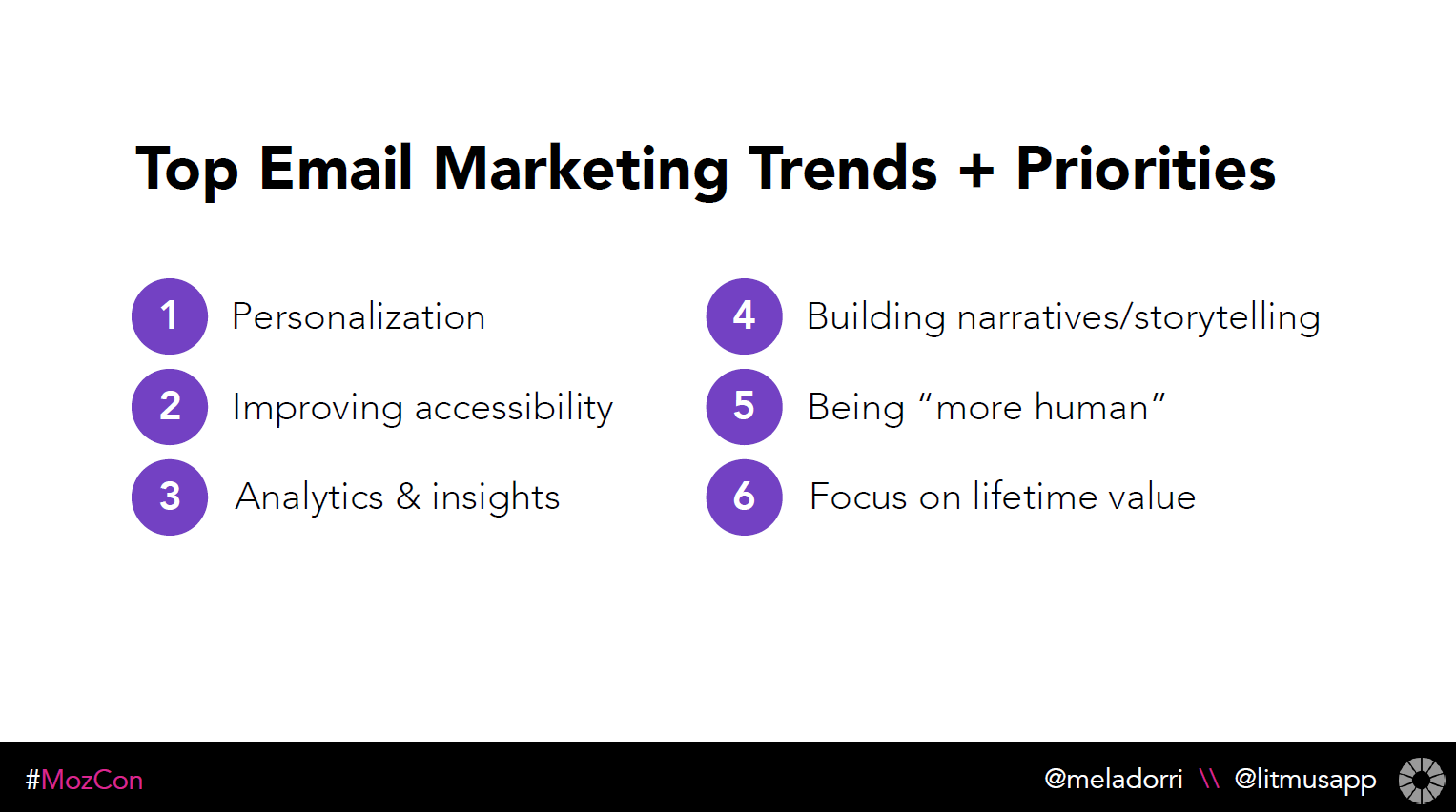
Source: Justine Jordan, MozCon 2018
More resources from my talk at #MozCon >>>
— Justine Jordan (@meladorri) July 10, 2018
✅ 24 Things to Check Before You Send: https://t.co/mHJNnkX0D4
📊The Best of the State of Email Survey Research Series: https://t.co/my0WluDUc8
📌Email Brief & Planning Template: https://t.co/2pVeyXSPRs
Heather Physioc: Your Red-Tape Toolkit: How to Win Trust and Get Your Search Work Implemented
Justine was followed by Heather Physioc Director of Organic Search and Performance Content at the agency VML. She discussed how to overcome the challenges of getting buy-in from clients for SEO work.
She started by lamenting a common problem among SEOs: website work and SEO recommendations that never end up getting implemented by the client. She highlighted that some of the most-frequently cited reasons for this roadblock are:
- Clients have a limited understanding of search
- Technical resource limitations for developers
- Lack of budget
- Bureaucratic red tape and slow approvals
She then provided several techniques to overcome obstacles to implementation, including approaching each client where they already are, in terms of understanding SEO. She provided a model for assessing a client’s understanding of search that addressed many elements of SEO.
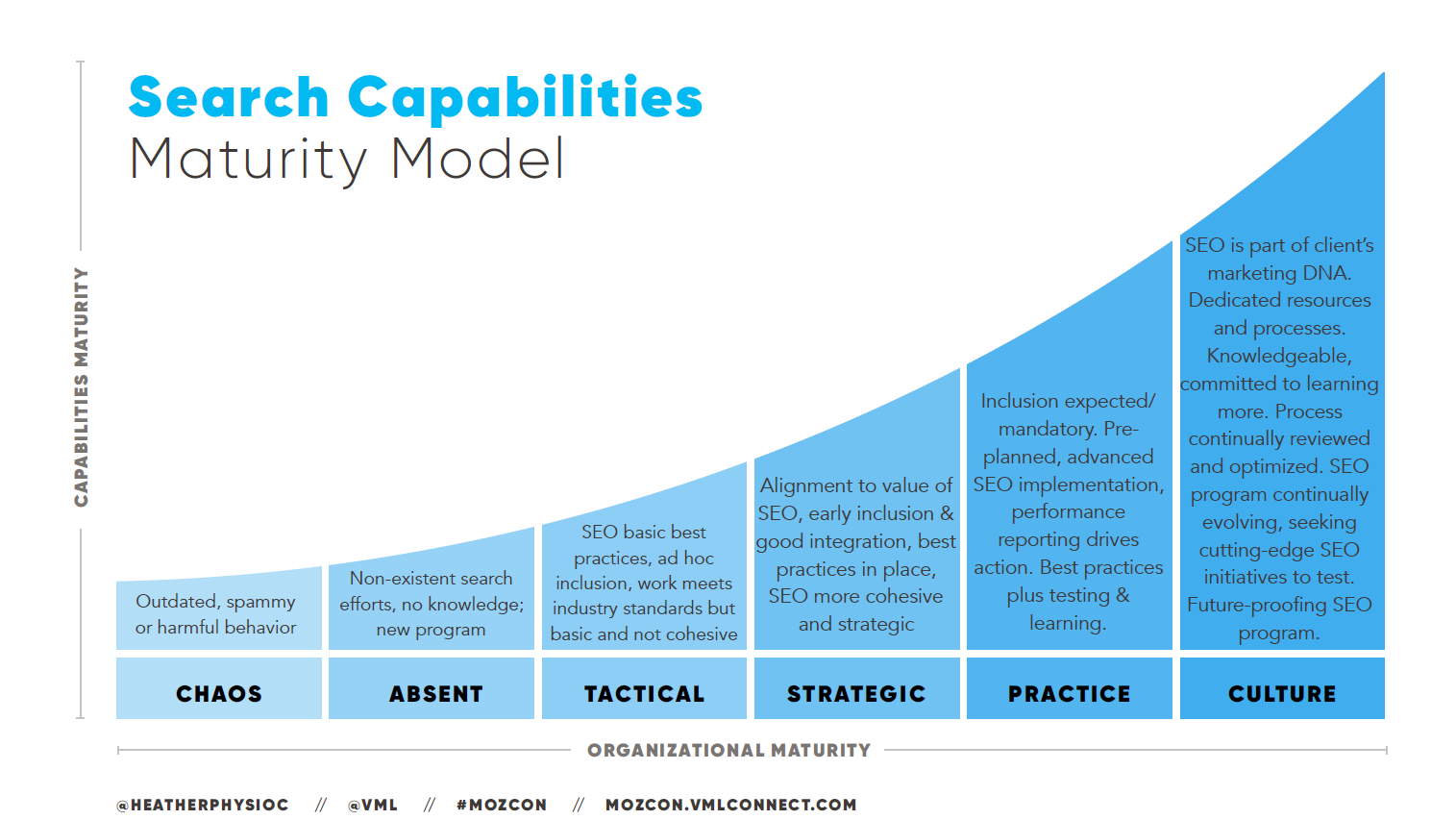
Source: Heather Physioc, MozCon 2018
Heather also addressed the importance of talking to the right person in an organization, encouraging the audience to talk about the outcomes of SEO work with decision makers, and to talk about that work the right away. One other great tip she had was seeking greater perspective about a client’s business, and prioritizing SEO projects that address the client’s goals, not your own.
Heather finished up with some tips for building great plans for each client:
- Ensure a simplified process
- Leverage case studies as proof of concept
- Assess the opportunity cost of each investment
- Forecast ROI (It doesn’t have to be scary!)
- Show the cost of inaction
And she encouraged persistence and collaboration to achieve success with clients.
Check out her slides, or the blog version of her presentation here, where she also links to resources you can use for assessing the state of SEO within a client’s organization. This assessment can guide client relations and help you understand how to communicate within the relationship.
Wil Reynolds: Bigger Data Requires Bigger Tools: How BI Helps You Tell Stronger Stories
Founder and Director of Strategy at Seer Interactive, Wil Reynolds, capped off day 2 with a presentation that addressed another common problem in the search industry, and really, the marketing industry as a whole — we often have more data on our hands than we know what to do with. Wil discussed techniques he and the team at Seer have been using to wrangle all the data to find insights that inform SEO strategy.
If you’re not here you’re missing out! Game changing information from @wilreynolds #mozcon2018 #Mozcon pic.twitter.com/Pg16ZpoN5R
— Klündt | Hosmer (@KlundtHosmer) July 10, 2018
Wil highlighted the ways he’s using Power BI and a variety of advanced data analysis techniques to go beyond basic reporting and deliver insights. He shared how the team is working to improve on the ways we’ve traditionally approached the services SEOs and digital marketers deliver to our clients, such as keyword research, competitive analysis, guidance on best practices.
Here’s a link to the homework Wil had expected us all to complete before we came to class, and some additional resources that can help out if you’re getting started with Power BI.
You’ll definitely want to check out what Wil and the team at Seer are up to — his presentation spoke a great deal to what I expect we’ll be seeing more of as the industry continues to grow. Fellow presenter Meredith Oliver offered this reflection on the reception of Wil’s presentation:
This. This is what happens when you kill a keynote. F- standing ovations. This is my new gold standard for speaking. @wilreynolds @SeerInteractive #mozcon pic.twitter.com/4utBAgZJFI
— 👠Meredith Oliver👠 (@MeredithCSP) July 11, 2018
After a quiet night and some great food at Wild Ginger in downtown Seattle to recharge before the last day, we headed into day 3.
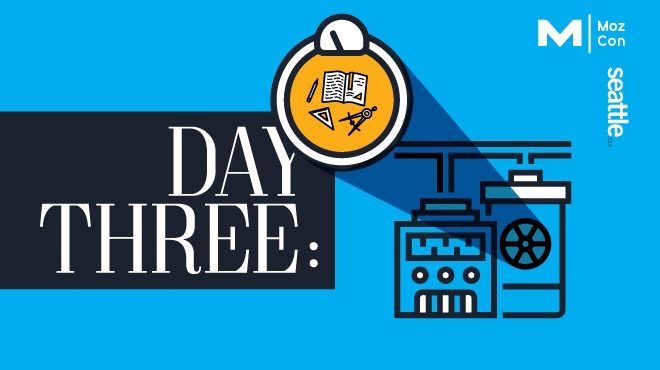
Day 3
Britney Muller: Machine Learning for SEOs
Bringing us into day 3, Britney presented what I think most MozCon attendees would agree was one of the most entertaining and endearing talks of the show. Britney is Senior SEO Scientist at Moz, infinitely curious, a popular conference speaker, and is also known for her Whiteboard Fridays.
Her discussion on machine learning and it’s SEO applications was a fun and exciting way to learn about the capabilities of this technology. Britney did a great job of making this technology accessible by highlighting some of the ways that we can apply it to real SEO problems — writing meta descriptions, for example!
Britney’s talk provided plenty of resources for anyone interested in trying their hand at writing machine learning-capable programs, even beginners. She also explained the common models of machine learning and shared some examples of how machine learning is being used today, from email inboxes to Netflix recommendations.
We also got to know some of Britney’s adorable animal friends, which kept the talk less intimidating and really fun!
Building an ML model:
— Tam Frager (@Tam5) July 11, 2018
1. Collect & clean your datasets
2. Build your model
3. Train
4. Evaluate
5. Predict@BritneyMuller#Mozcon pic.twitter.com/a43RiiFCRJ
Check out her slides here if you’d like to learn more about applying machine learning to SEO, or if you’re interested in giving it a go yourself!
Ashley Greene: Tools Change, People Don't: Empathy-Driven Online Marketing
Ashley Greene’s presentation before day 3’s lunch took a more philosophical approach than some of the more tactically-oriented presentations, but still provided a lot of value and delivered applicable insights. Ashley is the CEO and Founder of Instratify, a consumer insights firm.
Nice reminder of this @JeffBezos quote via @AshleyKGreene #MozCon2018 #mozcon pic.twitter.com/CwblBvTqdy
— Beanstalk (@beanstalk) July 11, 2018
She began by explaining the evolution towards customer-centric marketing, and how empathy drives what she referred to as the “Big Cs of Performance” — clicks, conversions, and currency.
She provided lots of examples of how the right approach to customer research can help us not only better understand our audience, but return real results that impact marketing success.
She also referenced a common problem that impacts the marketing strategy of many businesses — misguided understanding or perception of the business and what it provides, the root of which is internal bias. As a marketer, it’s easy to forget how our customers actually think about our business!
Check out this little highlight from the talk — Ashley recommends asking these questions during customer interviews:
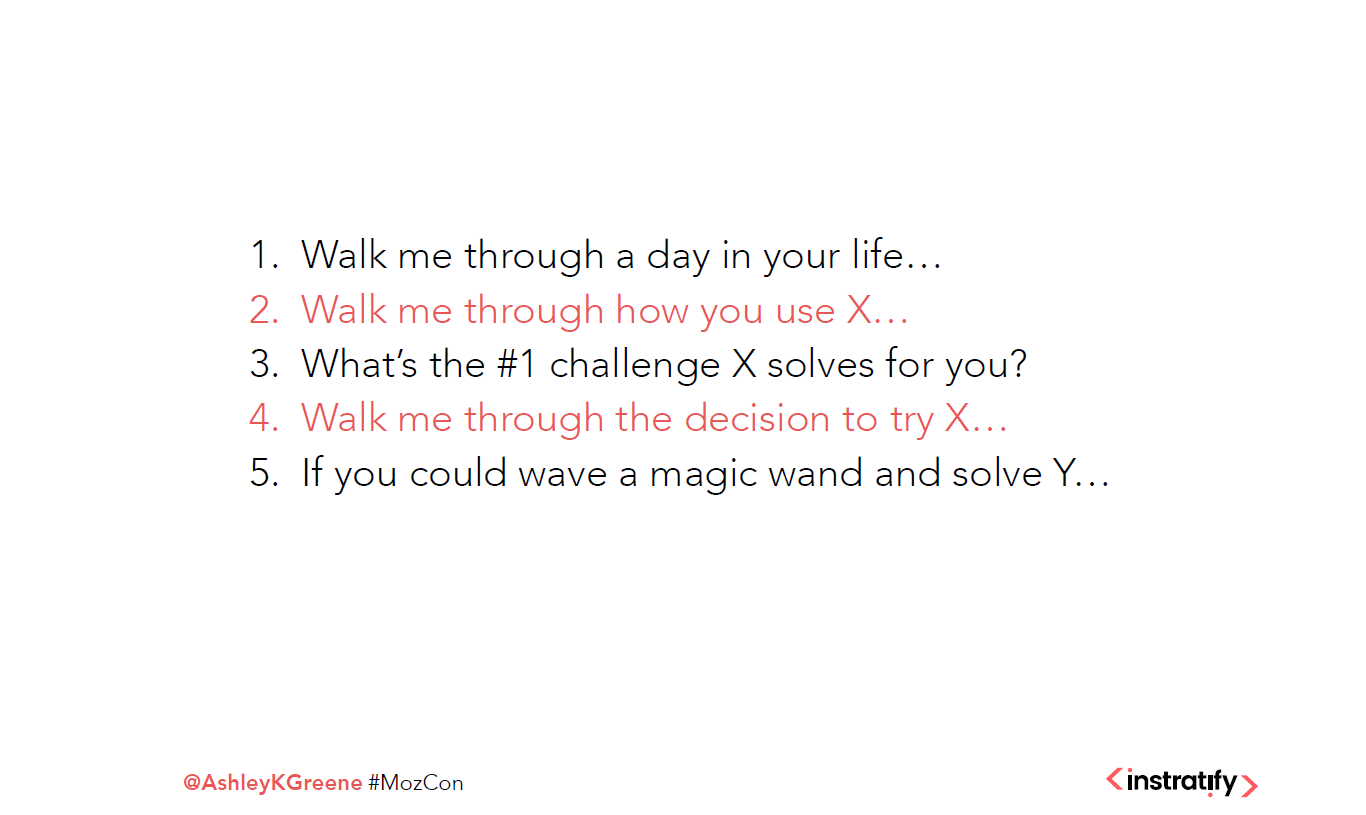
Source: Ashley Greene, MozCon 2018
Michael King: You Don’t Know SEO
After lunch, Michael King, the founder of iPullRank, started the afternoon with an insightful discussion about the value of a deeper understanding of information retrieval as an SEO professional.
Marketing and comics!? @iPullRank's #MozCon talk makes my geek heart happy.❤️ pic.twitter.com/czp2caGsj5
— Terra (@terrasum) July 11, 2018
He argued for SEO professionals to take more control over our understanding of information retrieval, instead of relying so heavily on the information resources available to us at Google to inform our decisions.
To illustrate his points, he explored some fascinating concepts related to information interpretation, indexing, and retrieval, and pointed to some actionable technical SEO practices that he believes may be overlooked, in part because of opportunities to dig deeper into the information Google provides us.
One small takeaway worth mentioning, as it was a common trend in many of the talks: internal linking is a powerful way to optimize the content you already have on hand! Don’t overlook the value.
He challenged SEOs to question whether their recommendations are both actionable and optimal:
- Can the team you’re working with implement your recommendation without additional discovery?
- Is this the best solution for the situation, or just a solution?
Mike also integrated a fun Avengers theme into the talk:
Mike King's slide deck is beautiful 😍 @iPullRank #MozCon #superheroes pic.twitter.com/2qC71Ive5e
— Claudia Gaitan (@upst4rt) July 11, 2018
Check out this post from Cyrus Shepard, referenced by Mike, if you’d like a great starting place to explore some of the technical techniques discussed. Charlie Williams’s article in the latest issue of PAGES SEO Magazine also provides some great insight on implementing some of those more advanced on-page techniques.
Dana DiTomaso: Focused Reporting: Fewer Reports that Do More
Dana is President and Partner at Kick Point, a digital agency. Something about Dana’s presentation style made her talk particularly engaging right off the bat, and her presentation remained among my favorites as I reflected on all of last week’s talks.
Dana addressed some of the most common SEO reporting problems and provided a constructive critique of some bad habits that tend to occur across the industry. While I personally don’t work client-side, insight on her approach to reporting was highly valuable to any marketer.
Check out what she addresses in the goal charters she creates for each of her clients at the beginning of the relationship:
- What are your goals?
- Why do these goals exist?
- How will we know when we’ve met the goal?
It sounds simple, but she explained that these documents are often extremely challenging to write!
Dana also addressed an important marketing concept: the difference between strategy and tactics, and related the relationship between the two to the relationship between monitoring and reporting. She emphasized that valuable reporting provides insights — things we didn’t already know.
Props to Dana for hooking attendees up with a tool that measures content consumption, and some pretty rad buttons!
Hey #mozcon! I have a ton of @kickpointinc buttons to give away! Find me at the conference and pick your favourite. pic.twitter.com/aQPv3UGEUN
— Dana DiTomaso (@danaditomaso) July 9, 2018
Rand Fishkin: Why Nine out of Ten Marketing Launches Suck (and How to Be the One that Doesn't)
Last but not least, Rand returned to the MozCon stage for a discussion on successful marketing launches — a concept that remains evergreen in the marketing discipline. The topic is also highly relevant to Rand’s personal career progression, as he’s in the middle of launching his new company SparkToro and has certainly participated in his fair share of launches in the past.
Rand began by explaining the value of marketing launches from the perspective of consumer behavior, exploring the ways that recency and newness influence consumer perception.
He then explained some common pitfalls of unsuccessful campaigns, including:
- Misaligned or unrealistic expectations
- Unhealthy team dynamics
- The wrong process for initiating a launch
- The lack of a compelling story
- Failure to reach the target audience
I found Rand’s discussions around building successful teams and choosing the correct process for a launch particularly helpful and interesting. Check out these highlights of some of the findings about what makes teams successful:
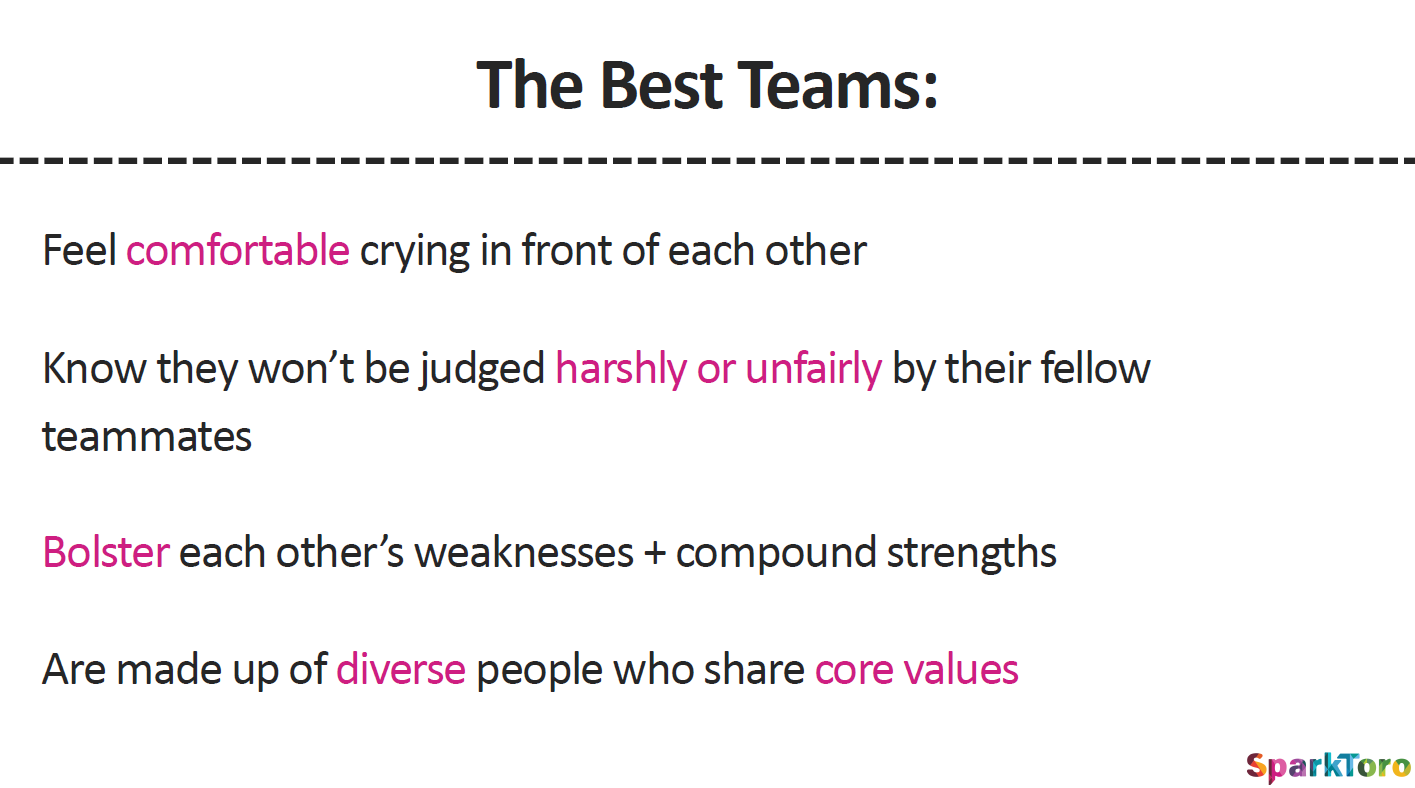 Source: Rand Fishkin, MozCon 2018
Source: Rand Fishkin, MozCon 2018
Rand also pointed out the many launch opportunities that marketers of all kinds frequently encounter, from changes in branding to website updates to new product releases. It’s important to look for these opportunities and consider how investing in a strategic launch could bolster the success of your next business initiative.
Overall, it was a great way to wrap up the conference, and I left excited to come back to Boise and share what I had learned with the team! There were lots of valuable takeaways and speakers at MozCon, and I’m excited to see how what they shared informs my own approach to marketing and the efficacy of the work I do at Page One Power.
Just a note: don’t discount the very real value of comfortable shoes at one of these conferences — you might be sitting for most of the day, but I definitely regretted trying out a new pair of mules on day 2. To the woman who complimented me on them and asked if they were comfortable: I didn’t have the heart to honestly tell you just how bad they were. Don’t make my mistake!
I hope this recap has been helpful if you missed MozCon this year, or if you’re curious about attending for the first time! Check out the schedule, slides, and notes from Rich Tatum if you’d like to learn more about a specific topic — you’ll likely be able to take away some great insights, even without having attended.
Thanks so much for reading!

